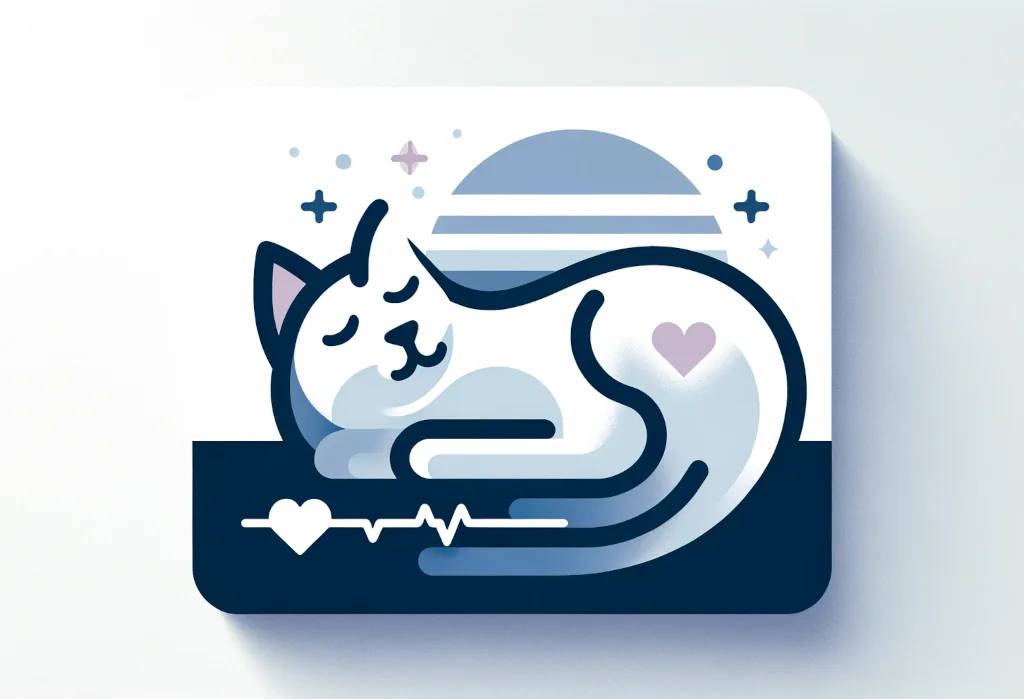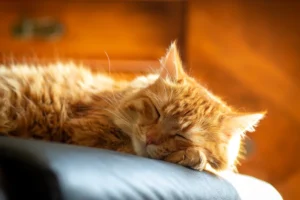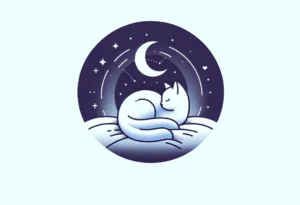Cats seem to live in a dream world, where the promise of a cozy nap is never too far away. Yet, when their snoozing seems to hit new records, it leaves many of us wondering if our feline friends are bored, lazy, or signaling something more concerning.
By the end of this post, you’ll have the insights to gauge whether your cat’s sleep is the epitome of kitty bliss or a cue for a health check-up.
Key takeaways:
- Cats typically need 12 to 16 hours of sleep, with variations due to age, health, and lifestyle—constant observation can detect if sleep patterns signal health issues.
- Sleep enhances a cat’s health by boosting their immune system, aiding in growth and tissue repair, and maintaining cognitive function and mood stability.
- Promote healthy cat sleep by providing a cozy bed, maintaining a quiet environment, keeping a consistent routine, engaging in active play, and ensuring proper nutrition and safe sunbathing.
Is My Cat Sleeping Too Much?
It’s no secret that cats love a good snooze, but just how much shut-eye do they need? On average, cats clock in a whopping 12 to 16 hours of sleep per day. Kittens and seniors tend to be on the higher end of that range, often snoozing for up to 20 hours! Young cats spend much of their time dreaming about their next pounce, while seniors may need more rest due to age-related changes in their bodies.
However, not all cats follow this sleep schedule to a T. Lifestyle factors, such as indoor versus outdoor living, can cause significant variations. Indoor cats may sleep more, but this isn’t always a worry – it could simply be a sign they’re in sync with the calm environment of your home.
Health can also toss a curveball into the mix, with certain conditions leading to both increased or decreased sleep. And what about breed? Well, some like the energetic Siamese may be less inclined to lounge for long periods, while the laid-back Persian might barely lift a paw from their favorite pillow.
What Does It Mean When My Cat Sleeps All Day?
Does your cat seem to be more snooze-happy than usual? While it’s true that cats often take relaxation to an Olympic level, there can be more behind those closed eyes.
If your normally playful pal is now a full-time nap champion, they could be telling you they’re under-stimulated. It’s not uncommon for cats to catch more Z’s out of sheer boredom or even depression, especially if they’re not getting enough interaction or environmental enrichment.
On the flip side, sleeping excessively may hint at something more concerning than just catching flies in their dreams. It’s your cue to keep an eye out. If you notice other red flags like changes in appetite or behavior, or if the extended sleep is a sudden shift, it could mean a trip to the vet is in order.
Can Changes in Sleep Patterns Indicate Health Problems?
Sure enough, a cat that flips its sleep schedule upside down or shows a marked decrease in those power naps might be sending up a flare signal for health issues. If your night-time prowler is suddenly all about day-time dreaming or vice versa, it’s time to pay attention. Sudden lethargy can be particularly telling.
Some specific health issues linked to altered sleep patterns include:
- Diabetes: A serious condition where the body has trouble regulating blood sugar levels. Look out for increased thirst and urination alongside changes in sleep.
- Hyperthyroidism: Characterized by an overactive thyroid gland, causing weight loss and restlessness – your cat might sleep less or seem more agitated.
- Kidney disease: Common in older cats, it can lead to general weakness or a dip in energy levels.
While these are a few examples, numerous other conditions can also affect sleep, so it’s wise to get a professional opinion. One piece of advice that often slips under the radar is monitoring your cat’s sleep in different locations. Cats feeling under the weather might seek out more secluded or unusual spots to rest. If you notice they’ve abandoned their usual sunny windowsill for a hidden nook, it could be more than a simple change of scenery – it’s a potential health clue.
Taking your furry friend to the vet for a check-up can ease your mind. The sooner you identify and address any health concerns, the better your chances of getting back to those carefree cat days (and nights) of typical feline lounging and prowling.
How Does Sleep Enhance My Cat’s Health?
Just like us, our feline friends reap some incredible benefits from a good night’s rest. Sleep isn’t just a time for your cat to dream about chasing mice; it’s a crucial period for their body to repair and regenerate.
When your cat is snoozing, their body is hard at work. Sleep is a power-up for their immune system, helping to fend off illnesses. This downtime provides an opportunity for their body to produce infection-fighting substances like cytokines, which help combat stress and infection. It’s like their body’s own little army getting equipped during the night to protect them during the day.
Growth hormone release mainly occurs during sleep, which is particularly vital for kittens as they develop. But don’t be fooled, adult cats still need it for maintenance and repair of their muscles and tissues. Picture your cat’s sleep as a pit stop in a race where they refuel, change tires, and get ready for the next lap.
Cognitive health is also on the sleep agenda. There’s a fascinating dance between neurons in your cat’s brain that only happens when they’re in dreamland. This dance helps consolidate memories and learning. It’s not just about committing the layout of the house to memory, but also important survival skills, like what that vacuum cleaner is and how to avoid it.
Mood regulation is yet another benefit of quality sleep. A sleep-deprived cat can be a cranky cat – and such moodiness isn’t just a coincidence. Serotonin and other neurotransmitters that influence mood are replenished during sleep, making your cat less likely to swat at your hand when you’re just trying to give them some love.
What Can You Do to Support Healthy Sleep Habits in Your Cat?
Supporting your cat’s sleep is about more than just providing a soft pillow. Here’s how you can help your feline friend catch the Z’s they need for a well-rounded, vibrant life.
-
Create a cozy haven: Invest in a comfortable, warm cat bed. Cats love soft, enclosed spaces, so a bed with raised edges could be a hit. You can place it in a quiet corner where they can escape the hustle and bustle of the house.
-
Maintain a chill vibe: Keep the noise down. Cats are light sleepers and can be easily disturbed by loud sounds. If you have a bustling household, consider a white noise machine near their resting area to help drown out the commotion.
-
Stay consistent: Cats are creatures of habit. Keeping a regular schedule for feeding, playtime, and cuddles can provide a sense of security and help them develop a natural sleep rhythm.
-
Engage in active play: Tire them out with some interactive playtime during the day. Use toys like feather wands or laser pointers to get them leaping and sprinting. It’s a great way to ensure they’re ready to snooze when nighttime comes.
-
Mind the menu: Watch what and when they eat. A cat who’s had a big meal right before bed may have too much energy to settle down, or worse, digestive issues that interrupt sleep.
Here’s a unique tip that’s often overlooked: Sunbathe safely. Cats love warmth, so allow your feline a safe spot to bask in the sun during the day. This not only makes them happy but can also regulate their natural sleep-wake cycle, known as their circadian rhythm. Just be sure to provide shady spots too, so they don’t overheat.
By turning these tips into habits, you’ll be setting up your cat for sleep success. Remember, a well-rested cat is a happier, healthier, and more lovable companion. It’s all about creating a serene space and a balanced lifestyle for your four-legged buddy.
When it comes to cat sleep behavior and health, these small changes can make a world of difference. So, give a little thought to your cat’s sleep environment tonight; they’ll thank you with purrs and head bumps tomorrow. Sweet dreams to your furry friend!
Alex, a passionate animal lover, has experience in training and understanding animal behavior. As a proud pet parent to two dogs and three cats, he founded AnimalReport.net to share insights from animal experts and expand his knowledge of the animal kingdom.





